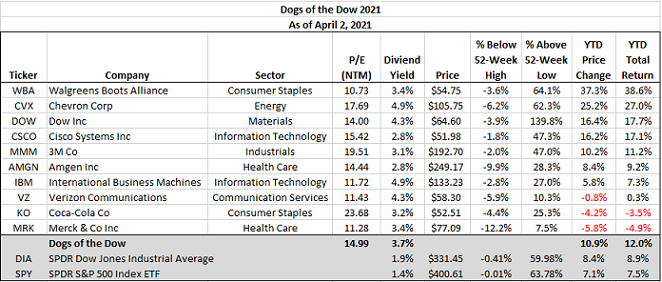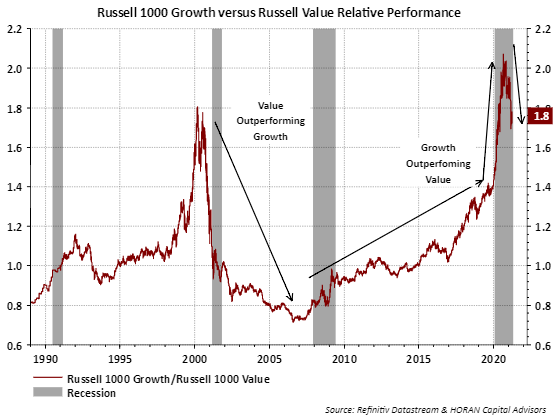Author: David Templeton, CFA, Principal and Portfolio Manager, HORAN
In 2020 the Dogs of the Dow strategy significantly lagged the return of the broader S&P 500 Index. For the 2020 calendar year the Dow Dogs returned a minus 8% versus the S&P 500 Index return of 18.4%. Several factors led to the Dow Dog underperformance. First, the 2020 Dow Dogs held two energy stocks out of the total ten stock portfolio. Exxon Mobil (XOM) was down 36% and Chevron (CVX) was down 29% last year. In the technology space, the two Dogs were IBM and Cisco (CSCO), down 1.2% and down 3.5%, respectively. For 2021 though, the Dow Dogs have jumped out to a strong start up 12.0% versus the SPDR Dow Jones Industrial Average (DIA) up 8.9% and the SPDR S&P 500 Index (SPY) up 7.5% as seen in the below table.

The Dogs of the Dow strategy is one where investors select the ten stocks that have the highest dividend yield from the stocks in the Dow Jones Industrial Index after the close of business on the last trading day of the year. Once the ten stocks are determined, an investor invests an equal dollar amount in each of the ten stocks and holds them for the entire next year. The popularity of the strategy is its singular focus on dividend yield.
Because of this income/yield focus, the Dow Dogs strategy tends to have a value style bias and this value bias contributed to the underperformance in 2020. Last year the Russell 1000 Growth Index was up 38.5% and the Russell 1000 Value Index was up only 2.8%. Just the opposite is unfolding this year with the value bias acting as a performance tailwind for the Dow Dog strategy. Year to date through April 1, the Russell 1000 Value index is up 12.3% and the Russell 1000 Growth Index is up 2.6%.
The growth style has dominated value since the end of the 2008/2009 financial crisis. If this recent rotation to value and its outperformance trend continues over the balance of this year, the Dow Dogs strategy may be a winning one in 2021.

HORAN Wealth, LLC is an SEC registered investment advisor. The information herein has been obtained from sources believed to be reliable, but we cannot assure its accuracy or completeness. Neither the information nor any opinion expressed constitutes a solicitation for the purchase or sale of any security. Any reference to past performance is not to be implied or construed as a guarantee of future results. Market conditions can vary widely over time and there is always the potential of losing money when investing in securities. HORAN Wealth and its affiliates do not provide tax, legal or accounting advice. This material has been prepared for informational purposes only, and is not intended to provide, and should not be relied on for tax, legal or accounting advice. You should consult your own tax, legal and accounting advisors before engaging in any transaction. For further information about HORAN Wealth, LLC, please see our Client Relationship Summary at adviserinfo.sec.gov/firm/summary/333974.

